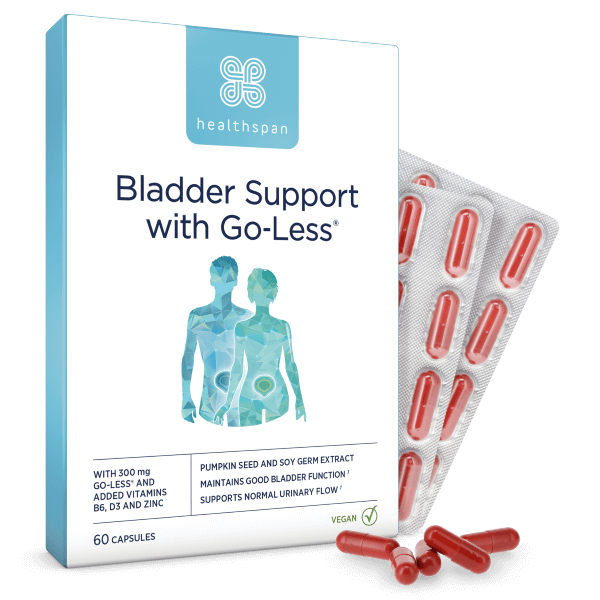Waking up frequently in the night to go to the toilet is known as nocturia. This can significantly disrupt sleep, with a knock-on effect on quality of life. Fortunately there are ways to help manage the condition, says nutritionist Rob Hobson.
Nocturia is a medical condition characterised by a frequent need to urinate during the night. It's one of the most common urinary symptoms among men. The term describes waking up twice or more in the night to urinate, and the condition affects 20-44% of men aged 20-40 years and up to 93% of men over the age of 70.
Nocturia can significantly disrupt sleep, with a knock-on effect on quality of life. Fortunately there are ways to help manage the condition.
What are the causes of nocturia?
Nocturia can be caused by different factors depending on the individual. One of the most common causes is ageing, as bladder capacity reduces as you get older. Ageing also causes the body to produce less vasopressin. This is the anti-diuretic hormone that slows the kidney's urine production at night, and a reduction can lead to the need to urinate more frequently.
Medical conditions may also increase the risk of nocturia, including diabetes, bladder infection, kidney problems and enlarged prostate. Lifestyle habits can also play a role, such as drinking too much before bed and consuming caffeinated drinks or alcohol, both of which can have a diuretic effect.
What are the symptoms of nocturia?
Frequent urination is the most obvious symptom of nocturia, but the impact on your sleep routine can affect you in other ways, including:
- Difficulty falling asleep or being able to stay asleep
- Daytime tiredness and an increased need to nap, further disrupting sleep patterns at night
- Incontinence (involuntary leakage of urine)
- Increased risk of low mood and depression
- Increased risk of falls and fractures
- Cognitive dysfunction (difficulty paying attention and remembering)
Your GP may ask a series of questions such as:
- How often do you urinate during the day?
- How often do you wake up at night to urinate?
- Does your body make more or less urine than before?
- Do you have a family history of bladder problems, kidney disease or diabetes?
- What makes your symptoms worse?
Alongside this, the below tests may be needed to diagnose underlying medical conditions:
- Blood sugar
- Blood urea
- Urine culture samples
What can you do to overcome nocturia?
There are several ways to help overcome nocturia, through addressing specific health issues or making lifestyle changes.
- Limit your intake of fluids in the hours before you go to bed. This can help to reduce urine production and the number of times you visit the bathroom.
- Managing any health conditions such as diabetes or an enlarged prostate with medication or some other treatment can help to reduce the frequency of nocturia.
- Regular exercises, such as those to strengthen your pelvic floor, can help improve bladder control.
- Review your medications if they are causing nocturia. Medicines impacting urine production include diuretics, anticholinergics (including antihistamines, some antidepressants and muscle relaxants) and beta blockers.
- Adopt better sleep hygiene habits by creating a relaxing sleep oasis in your room, avoiding alcohol and caffeine before bed and creating a strategy that helps you get back to sleep quickly once you have woken up to use the bathroom.
- Cognitive behaviour therapy can help people develop mechanisms to cope with the symptoms of nocturia, such as anxiety and low mood. This may include relaxation techniques to help them fall asleep more quickly after waking up. The same therapy is used to help people manage symptoms of insomnia.
Can supplements help with nocturia?
There are no supplements specifically proven to treat nocturia. Still, some may help alleviate the symptoms or address some underlying issues contributing to the condition.
- Magnesium is one of the most abundant minerals in the body. It plays many roles, including proper muscle and nerve function. Magnesium may be useful in people with low intakes by helping to relax the bladder muscles and reduce urinary urgency and frequency, although this is not scientifically proven.
- Pumpkin seed extract is a supplement that helps maintain good bladder function and urinary flow, particularly among men with enlarged prostate (benign prostatic hyperplasia).
- Results from a study have shown that pumpkin seed extract helped decrease nocturia over time significantly, reduced residual urine volume and positively impacted bladder health, helping to improve quality of life.

Bladder Support with Go-Less®
For good bladder health and urinary flow
- Contains 300mg Go-Less® pumpkin seed and soy germ extract
- Vitamins B6 and D3 for hormonal balance and muscle support
- Suitable for men and women
Is nocturia the same as nocturnal polyuria?
The two conditions are not the same. Nocturnal polyuria is when the body makes too much urine, resulting in the passage of large volumes of urine with increased urinary frequency. Nocturia is a bladder storage problem, where the body doesn't store or release urine well.
Nocturia can significantly disrupt your sleep and daily activities, but there are things you can do to try to overcome it. Limiting your fluid intake, managing underlying medical conditions, exercising regularly, adjusting medications, practising good sleep habits, taking supplements and considering behavioural therapy can help to reduce the impact of nocturia and improve your quality of life.
You can also visit your GP to help with a treatment plan.






